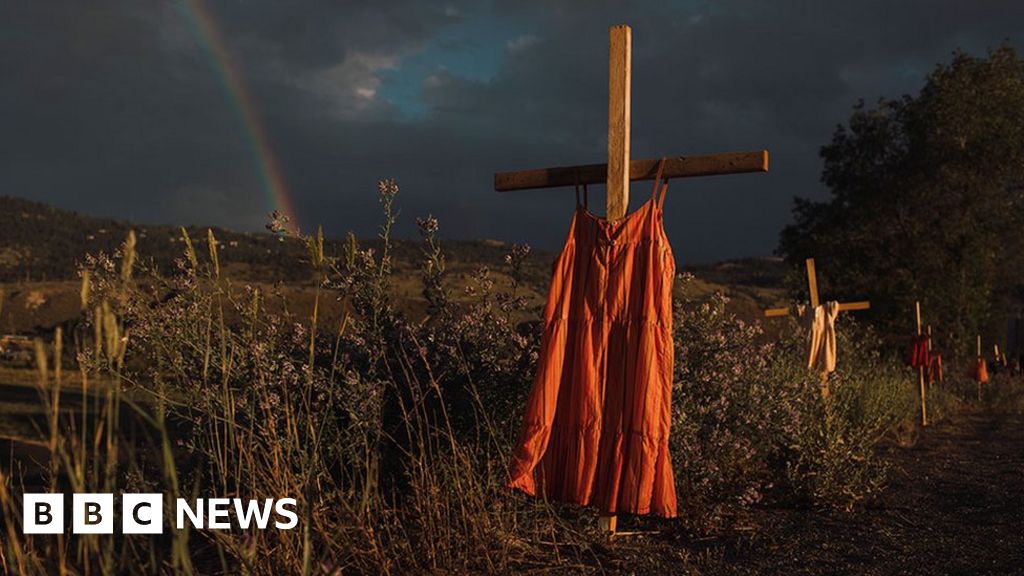World Press Photo Contest 2022: Global winners revealed

Table of Contents
Amber Bracken’s picture, entitled Kamloops Residential School, has been named World Press Photo of the Year.
Taken for The New York Times, the image shows red dresses hung on crosses along a roadside to commemorate children who died at the Kamloops Indian Residential School, an institution created to assimilate indigenous children, in British Columbia, Canada.
The photo was shot in June 2021, following the detection of as many as 215 unmarked graves at the site of the former school, which closed in 1978.
“It is an image that sears itself into your memory, it inspires a kind of sensory reaction,” said jury chairperson Rena Effendi.
“I could almost hear the quietness in this photograph, a quiet moment of global reckoning for the history of colonisation, not only in Canada but around the world.”
Ms Bracken’s photo also won the Singles award in the regional North and Central America category.
The World Press Photo Contest recognises the best photojournalism and documentary photography.
This year’s winners were chosen from 64,823 entries taken by 4,066 photographers from 130 countries.
Matthew Abbott was named the winner of the World Press Photo Story of the Year category, with his series Saving Forests with Fire, taken for National Geographic and Panos Pictures.
The photos show indigenous Australians strategically burning land in a practice known as Cool Burning, in which fires move slowly, burn only the undergrowth, and remove the build-up of fuel that feeds bigger blazes.
The series featured the Nawarddeken people of West Arnhem Land, Australia, who have been carrying out the practice for tens of thousands of years.
The jury chose Amazonian Dystopia by Lalo de Almeida as the winner of the Long-Term Project Award.
The photos, taken for Folha de São Paulo and Panos Pictures, show the threat to the Amazon rainforest from deforestation, mining, infrastructural development and the exploitation of natural resources under Brazil’s President Jair Bolsonaro.
“This project portrays something that does not just have negative effects on the local community, but also globally, as it triggers a chain of reactions,” said Ms Effendi.
The series also won the Stories award in the regional Southeast Asia and Oceania category.
Blood is a Seed, by Isadora Romero, was awarded the World Press Photo Open Format Award.
Through personal stories and a journey to Ms Romero’s ancestral village of Une, Cundinamarca, Colombia, the project questions the disappearance of seeds, forced migration, colonisation, and the subsequent loss of ancestral knowledge.
The World Press Photo regional winners were also announced, some of which can be seen below, with captions from the competition.
Africa, Singles: Sudan Protests, by Faiz Abubakr Mohamed, Sudan
A protester throws back a tear gas canister that had been fired by security forces during a march demanding an end to military rule, in Khartoum, Sudan, on 30 December 2021
Africa, Stories: Afraid to go to School, by Sodiq Adelakun Adekola, Nigeria, for Agence France-Presse
Aminah Labaran (not her real name) cries at home, in Jangebe, Zamfara State, northwest Nigeria, on 27 February 2021, the day after her two daughters were abducted. Gunmen, apparently from a bandit group, snatched 279 girls from dormitories in the middle of the night, at the Government Girls Secondary School in the village
Asia, Singles: Palestinian Children in Gaza, by Fatima Shbair, Gaza, for Getty Images
Palestinian children gather with candles during a ceasefire in Beit Lahia, Gaza, on 25 May 2021
Asia, Stories: The Cinema of Kabul, by Bram Janssen, the Netherlands, for the Associated Press
Gul Mohammed, who works as an usher in the Ariana Cinema in Kabul, Afghanistan, poses for a photograph on 4 November 2021, nearly three months after the Taliban closed the cinema
Europe, Singles: Evia Island Wildfires, by Konstantinos Tsakalidis, Greece, for Bloomberg News
Panayiota Kritsiopi cries out as a wildfire approaches her house in the village of Gouves, on the island of Evia, Greece, on 8 August 2021
Europe, Stories: As Frozen Land Burns, by Nanna Heitmann, Russia/Germany, for Magnum Photos
Local firefighting volunteers take a break for food in Magaras, central Sakha, Siberia, Russia, on 1 July 2021
North and Central America, Stories: The People Who Feed the United States, by Ismail Ferdous, Bangladesh, for Agence VU’
Sandra Sibert sits with her husband, James, in the room where she had to stay in isolation with Covid-19, in Sioux Falls, South Dakota, USA, on 7 September 2020
South America, Singles: San Isidro Settlement Eviction, by Vladimir Encina, Colombia
Police agents arrest a man while his wife and family resist, during evictions of people from the San Isidro settlement, in Puerto Caldas, Risaralda, Colombia, on 6 March 2021
South America, Stories: The Promise, by Irina Werning, Argentina, for Pulitzer Center
Antonella studies via Zoom, using her mother’s mobile phone, in her room at home in Buenos Aires, Argentina, on 13 June 2021
Southeast Asia and Oceania, Singles: Slingshots, by anonymous, for The New York Times
Protesters use slingshots and other homemade weapons in a clash with security forces in Yangon, Myanmar
All pictures are subject to copyright.







